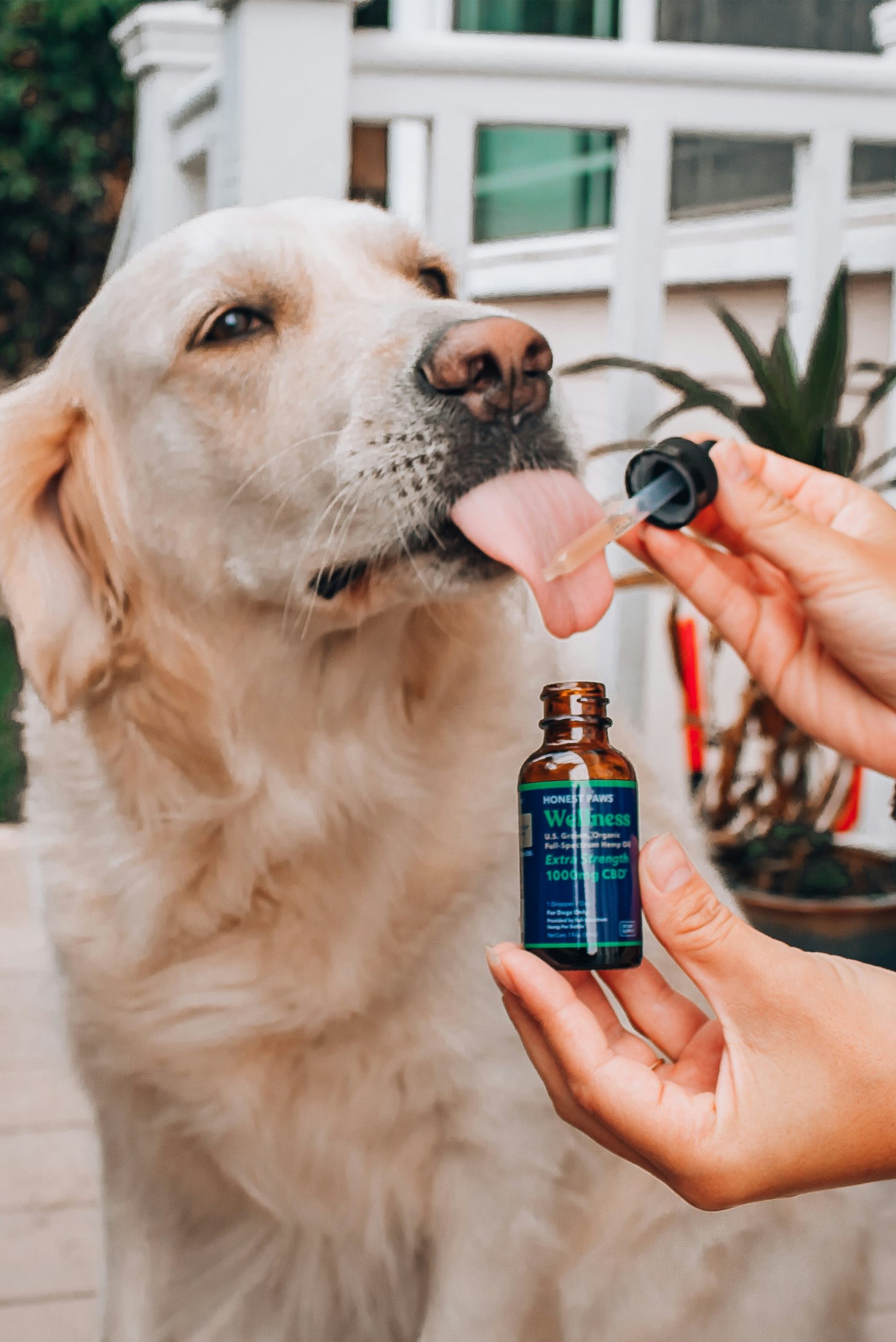Unveiling the Healing Power of CBD for Canine Companions
The Potential Benefits of CBD for Dogs: Discover the anti-inflammatory, pain-relieving, and seizure-reducing properties of CBD for dogs, and learn about the importance of consulting a veterinarian for safe and effective use.
Overview of CBD Benefits for Dogs
CBD, or cannabidiol, is a non-intoxicating compound derived from hemp or marijuana plants, gaining recognition in veterinary medicine for its potential benefits for dogs. These benefits are being increasingly studied, with CBD products for dogs available in various forms such as oils and treats, providing a convenient way to administer the compound.
Research suggests that CBD can potentially aid in managing various health conditions in dogs, including anxiety, pain, and skin issues like atopic dermatitis. For instance, CBD’s anti-inflammatory properties can be particularly beneficial for dogs with osteoarthritis, as it may help reduce pain and improve mobility. Moreover, studies have shown promising results in reducing seizure frequency and intensity in epileptic dogs when using CBD as part of their treatment regimen, [4].
Furthermore, CBD interacts with the endocannabinoid system in dogs, which is responsible for regulating key physiological processes. By binding to specific receptors within this system, CBD can influence pain perception, inflammation, and other functions, without causing the psychoactive effects associated with THC. This makes CBD a safe and potentially effective option for managing various health issues in dogs, under the guidance of a veterinarian.
Understanding CBD and Its Mechanism in Dogs
CBD interacts with the endocannabinoid system in dogs, a complex network of receptors spread throughout the body that helps regulate various physiological processes. The endocannabinoid system plays a crucial role in maintaining balance, or homeostasis, in the body. When CBD is introduced into a dog’s system, it interacts with these receptors, influencing functions such as pain perception, immune response, mood, and appetite regulation. An example of this interaction is how CBD can help reduce inflammation in dogs with conditions like arthritis or atopic dermatitis, providing relief without the side effects of traditional medications.
Moreover, the endocannabinoid system in dogs is involved in modulating stress responses, which is where CBD’s potential for managing anxiety in dogs comes into play. By interacting with the receptors related to stress and anxiety, CBD may help calm anxious dogs in stressful situations. This mechanism of action is valuable for pet owners looking for natural ways to support their dogs’ emotional well-being. Understanding how CBD interacts with the endocannabinoid system sheds light on its therapeutic benefits and why it is gaining attention in veterinary medicine as a holistic wellness option for dogs.
Specific Benefits of CBD for Dogs
CBD has shown promising anti-inflammatory effects that can benefit dogs suffering from conditions like osteoarthritis. Additionally, research indicates that CBD may be effective in managing atopic dermatitis, a prevalent skin condition in dogs, and in reducing the frequency and intensity of seizures in epileptic dogs [4], [5]. For instance, a recent study highlighted a notable decrease in seizure occurrences and severity in epileptic dogs following the administration of CBD.
Moreover, CBD’s potential to alleviate anxiety in dogs is gaining attention in the veterinary field. Studies have suggested that CBD could help reduce stress and anxiety-related behaviors in dogs, promoting a sense of calmness and well-being. For instance, anecdotal evidence from pet owners and veterinarians reveals instances where CBD has helped dogs with separation anxiety or fear of loud noises to become more relaxed and less agitated, enhancing their quality of life, [5]. The calming effects of CBD make it a promising natural option for managing anxiety in dogs without the sedative effects commonly associated with traditional medications.
Safety Considerations when Using CBD for Dogs
Safety is paramount when considering the use of CBD products for dogs. It is imperative to source these products from reputable manufacturers with a commitment to organic practices to guarantee the purity and quality of the CBD. For instance, Dr. Joseph J. Wakshlag advises using CBD products grown organically, extracted using supercritical carbon dioxide, and evaluated by an independent company to ensure safety and efficacy. This step is crucial because CBD is not yet regulated by the FDA, leading to varying product quality and potential contamination issues.
Moreover, seeking guidance from a veterinarian before incorporating CBD into a dog’s regimen is highly recommended, especially if the dog is currently on other medications. Consulting a professional ensures that potential interactions between CBD and other drugs can be evaluated, preventing any adverse effects on the dog’s health. The expertise of a veterinarian is invaluable in navigating the complexities of using CBD for dogs, as they can provide personalized advice based on the dog’s specific health needs, ultimately promoting a safe and tailored approach to CBD usage. By prioritizing these safety considerations, pet owners can mitigate risks and maximize the potential benefits of CBD for their furry companions.
Consultation with a Veterinarian for CBD Use
When considering the use of CBD for dogs, consulting a veterinarian is crucial to ensure the well-being of your furry companion. Veterinarians play a vital role in providing guidance on the suitable dosage of CBD tailored to the specific needs of your dog, taking into account factors such as their size, health condition, and individual requirements. For instance, a small dog may require a different dosage compared to a larger breed, and a veterinarian’s expertise can help determine the most appropriate amount of CBD for each case.
Moreover, the absence of standardized dosing guidelines for CBD underscores the importance of seeking professional advice from a veterinarian. By consulting a veterinary professional, pet owners can gain valuable insights into the safe and effective use of CBD products for their dogs. Veterinarians can offer personalized recommendations, considering any existing medications or health conditions that may interact with CBD. They can also closely monitor the dog’s response to CBD, making necessary adjustments to the dosage or treatment plan to ensure optimal outcomes and minimize any potential risks associated with its use.
Current Research and Future Directions
Ongoing research in the field of veterinary medicine is delving into the potential benefits of CBD for managing a spectrum of health conditions in dogs. For instance, recent studies have shown promising results in using CBD to alleviate anxiety and pain in dogs, shedding light on its therapeutic applications beyond traditional medications. One notable area of interest is the impact of CBD on dogs suffering from osteoarthritis, where CBD’s anti-inflammatory properties have shown significant potential in reducing pain and improving mobility in affected animals.
Furthermore, the scientific community acknowledges the necessity for continued research efforts to solidify evidence-based recommendations for the utilization of CBD in veterinary medicine. While preliminary studies have hinted at the efficacy of CBD in addressing certain health issues in dogs, further comprehensive research is essential to establish standardized dosing guidelines, understand potential interactions with existing medications, and ascertain its long-term effects on canine health. This emphasis on ongoing research underscores the dynamic nature of CBD studies in dogs, urging veterinarians and pet owners alike to keep abreast of the latest discoveries and advancements in the field to make informed decisions regarding their furry companions’ well-being.



